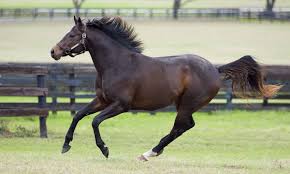
Thoroughbred
Conditions of detention
Thoroughbreds require ample space to move freely, as they are highly active and energetic horses. They thrive in environments that provide large pastures or paddocks where they can exercise regularly. Access to a clean, well-ventilated stable is also essential for their rest and protection from harsh weather conditions.
Useful Fact: Thoroughbreds do best in temperate climates and need to be stabled or sheltered during extreme weather conditions.
Nutrition and diet
Thoroughbreds have high energy needs due to their athletic nature. Their diet typically consists of high-quality hay, grains (such as oats and barley), and specialized feed to ensure they receive the right balance of nutrients. Fresh water must always be available.
Useful Fact: It’s crucial to provide Thoroughbreds with a diet high in fiber and balanced in proteins, fats, vitamins, and minerals to support their active lifestyle.
Health
Thoroughbreds are prone to certain health issues, including respiratory problems, joint issues like arthritis, and gastrointestinal conditions such as colic. Regular veterinary check-ups are essential to monitor their health.
Useful Fact: Due to their thin skin and fine coat, Thoroughbreds are more susceptible to cuts and abrasions, so regular health monitoring is necessary.
Grooming and care
Thoroughbreds require daily grooming to keep their coat clean and free from dirt and debris. Regular hoof care, including trimming and shoeing, is also necessary to prevent issues like cracks or infections.
Useful Fact: Regular grooming not only keeps the horse clean but also helps to build a bond between the horse and the caretaker, which is vital for training and handling.
Education and training
Thoroughbreds are intelligent and respond well to training, especially when it begins at an early age. However, they can be sensitive and sometimes high-strung, so training should be consistent, patient, and positive.
Useful Fact: Thoroughbreds are often started in training as yearlings (at around one year old), especially if they are being prepared for a racing career.
Toys and entertainment
Due to their high energy levels, Thoroughbreds benefit from toys that stimulate both their minds and bodies. Items such as treat balls, hanging toys, and interactive feeders can help keep them occupied.
Useful Fact: Mental stimulation is just as important as physical exercise for Thoroughbreds to prevent boredom and associated behavioral issues.
Safety
Thoroughbreds are strong and fast, requiring secure fencing to ensure their safety. Fencing should be high enough to prevent them from jumping over and free of sharp edges that could cause injury.
Useful Fact: Electric fencing can be effective for Thoroughbreds, but it should be installed and maintained properly to avoid accidents.
Accessories
Common accessories for Thoroughbreds include high-quality saddles and bridles, horse boots for leg protection, and blankets for warmth during colder months.
Useful Fact: It’s important to regularly check the fit of tack and accessories, as improperly fitted gear can cause discomfort or injury.
Socialization
Thoroughbreds are social animals and thrive when they have regular interaction with other horses and humans. Being herd animals, they enjoy companionship and can become stressed if isolated.
Useful Fact: Socializing with other horses is essential for a Thoroughbred’s mental well-being, reducing anxiety and encouraging natural behaviors.
Travel and Transportation
When transporting Thoroughbreds, it is important to use a well-ventilated trailer with sufficient space for them to stand comfortably. Frequent stops should be made during long journeys to allow for rest and hydration.
Useful Fact: Thoroughbreds are prone to stress during transport, so familiarity with the trailer and gradual exposure to travel can help ease anxiety.
Behavior and psychology
Thoroughbreds are known for their spirited and sometimes sensitive nature. They can be highly alert and may react quickly to unfamiliar stimuli, which requires a calm and confident handler.
Useful Fact: Due to their sensitivity, Thoroughbreds benefit from a predictable routine and a calm environment to reduce stress and anxiety.
Legal aspects
Owning a Thoroughbred often involves specific legal considerations, especially in racing. Registration with organizations like The Jockey Club is required for participation in official races, and there are rules regarding breeding, sale, and competition.
Useful Fact: In racing, there are strict regulations regarding the use of performance-enhancing substances, and owners must comply with these to avoid penalties.


